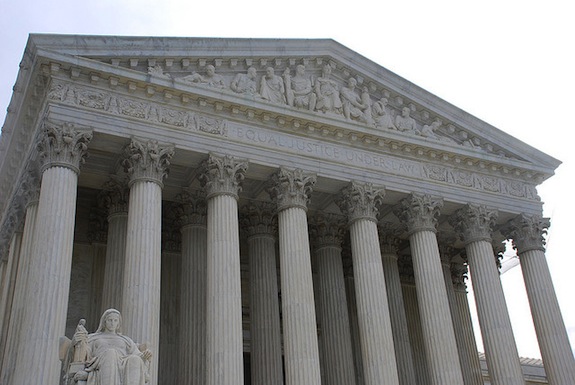
The U.S. Supreme Court is taking another look at the constitutionality of the Voting Rights Act. (Photo by Mike Renlund.)
By Ashley Lopez
Florida Center for Investigative Reporting
In a little-reported announcement on Nov. 9, the Supreme Court of the United States announced it would take a second look at the Voting Rights Act of 1965, a law aimed at protecting the voting rights of minorities.
In the target of the court is a provision in the Voting Rights Act that requires the federal government to approve new voting laws in certain counties or entire states across the country. The government must approve voting laws in the states to ensure that their implementation would not curtail the voting rights of minorities.
In Florida, five counties — Collier, Hardee, Hendry, Hillsborough and Monroe — fall under this provision of the Voting Rights Act, also known as Section 5.
In 1965, counties protected by Section 5 were chosen according to population. Back then, any county or state that had less than half of its voting population registered to vote was chosen for Section 5 status, because it signaled that there was a large minority population in those regions that had before that time been unable to vote.
In the past several years, conservatives have argued that such a law or provision is no longer necessary, but courts have thrown out any attempt to undermine the law.
However, this time might be different.
The last time conservatives challenged Section 5, in 2009, the Supreme Court handed down a very narrow 8-1 ruling (Clarence Thomas was the only dissenter) that did not declare the law unconstitutional.
The fact that the court is taking up a Section 5 case again so soon suggests strongly that the intent is to strike down part or all of the Voting Rights Act.
Although Section 5 survived in 2009, conservative justices appeared to believe that the law was discriminatory—against Southern white people. “Is it your position that today Southerners are more likely to discriminate than Northerners?” Chief Justice John Roberts demanded of the attorney defending the Voting Rights Act at the time. Despite the 8-1 vote, the 2009 decision was widely seen as leaving Section 5 hanging by a thread. The justices hinted very strongly that Congress, which had just reauthorized the Voting Rights Act in its entirety in 2006, should change the law soon or risk it being declared unconstitutional next time around.
This year, Section 5 of the Voting Rights Act stopped some Florida counties from cutting early voting days — as mandated by a 2011 voting law from the GOP-led Florida Legislature — without extending voting hours to make up for the loss in days.
A federal court did not approve Florida’s law for those five Voting Rights Act-protected counties until officials in those counties agreed to extend hours to 12 during early voting days.
The other 62 counties in Florida, however, were allowed to cut days without accommodating longer hours during the days they could hold early voting.
During the general election, many experts partially blamed the reduction in early voting for the many voting and ballot counting snafus in Florida.
